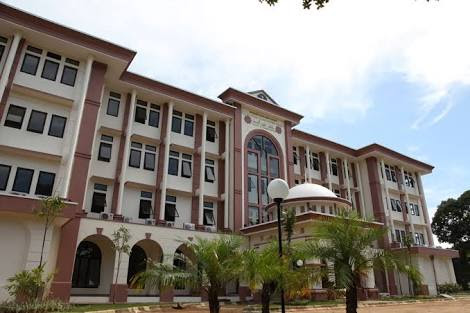DEVELOPMENT OF HOTS-BASED FUNCTION DERIVATIVE WORKSHEET THROUGH A NETWORK LEARNING SYSTEM SPADA
Abstract
This study aims to develop a valid, effective, and practical HOTS-based worksheet for calculus courses in the Mathematics Education Department. The development of the worksheet is expected to improve critical and creative thinking skills, which is implemented through the Online Learning System (SPADA). This research is development research with the research subject being 27 students of Mathematics Education, Muhammadiyah University of Makassar. The instruments used in this study were instrument validation sheets, test, and student response questionnaires. This worksheet development process is adapted from the model of development of the 4-D models, which consists of define, design, develop, and disseminate. The results of the validation assessment were an average score of 3.61 in the valid categories. The result of the lecturers' practicality at 3.6 with the practical category. Furthermore, the results of the effectiveness assessment through the HOTS test showed that the percentage of classical completeness was 86.7%. The students' responses showed a positive response to this worksheet. The assessment results showed that the average pretest was 46.85, while the postest was 74.81. There is an increase in the average value of higher-order thinking skills from pretest to postest in field trials. So it produces worksheets based on HOTS through SPADA that have met the valid, practical, and effective aspects and can facilitate students in practicing their higher-order thinking skills.
Downloads
References
Alam, S. (2019). Higher order thinking skills (HOTS): Kemampuan memecahkan masalah, berpikir kritis dan kreatif dalam pendidikan seni untuk menghadapi revolusi industri 4.0 pada era society 5.0. Prosiding Seminar Nasional Pascasarjana (PROSNAMPAS).
Anggraini, W., Anwar, Y., & Madang, K. (2016). Pengembangan lembar kerja peserta didik (LKPD) berbasis learning cycle 7E materi sistem sirkulasi pada manusia untuk kelas XI SMA. Jurnal Pembelajaran Biologi: Kajian Biologi Dan Pembelajarannya, 3(1), 49–57. Retrieved from https://ejournal.unsri.ac.id/index.php/fpb/article/view/4956.
Arifin, Z., & Retnawati, H. (2017). Pengembangan instrumen pengukur higher order thinking skills matematika siswa SMA kelas X. PYTHAGORAS: Jurnal Pendidikan Matematika, 12(1). https://doi.org/10.21831/pg.v12i1.14058.
Arnellis, Suherman, & Amalita, N. (2019). Pengembangan learning trajectory kalkulus berbasis high order thinking skills dengan pendekatan realistic mathematics education siswa SMA Kota Padang. Menara Ilmu, 13(6). https://doi.org/10.33559/mi.v13i6.1399.
Dosinaeng, W. B. N., Leton, S. I., & Lakapu, M. (2019). Kemampuan mahasiswa dalam menyelesaikan masalah matematis berorientasi HOTS. JNPM (Jurnal Nasional Pendidikan Matematika), 3(2). https://doi.org/10.33603/jnpm.v3i2.2197.
Ikman, Hasnawati, & Rezky, M. F. (2016). Effect of problem based learning (PBL) models of critical thinking ability students on the early mathematics ability. International Journal of Education and Research, 4(7), 361–374. Retrieved from https://www.ijern.com/journal/2016/July-2016/29.pdf.
Karsono. (2017). Pengaruh penggunaan LKS berbasis hots terhadap motivasi dan hasil belajar IPA siswa SMP. Jurnal Pendidikan Matematika Dan Sains, 5(1). https://doi.org/10.21831/jpms.v5i1.13540.
Khoriyah, M., & Oktiningrum, W. (2021). Pengembangan soal higher order thinking skills (HOTS) berbasis budaya lokal Blitar untuk mengukur dimensi pengetahuan matematika siswa kelas V sekolah dasar. Bina Gogik: Jurnal Ilmiah Pendidikan Guru Sekolah Dasar, 8(1), 93–100. Retrieved from https://ejournal.stkipbbm.ac.id/index.php/pgsd/article/view/610.
Kurniawati, W. (2014). Pengembangan perangkat perkuliahan IPA 2 dengan pendekatan problem based learning untuk meningkatkan keterampilan higher order thinking mahasiswa program studi pendidikan guru sekolah dasar. Elementary School: Jurnal Pendidikan Dan Pembelajaran Ke-SD-An, 1(1). Retrieved from https://journal.upy.ac.id/index.php/es/article/view/788.
Nurhikmayati, I., & Jatisunda, M. G. (2019). Pengembangan bahan ajar matematika berbasis scientific yang berorientasi pada kemampuan berpikir kritis matematis siswa. Mosharafa: Jurnal Pendidikan Matematika, 8(1), 49–60. https://doi.org/10.31980/mosharafa.v8i1.385.
Nurwahidah, I. (2018). Pengembangan soal penalaran model TIMSS untuk mengukur high order thinking (HOT). THABIEA : JOURNAL OF NATURAL SCIENCE TEACHING, 1(1). https://doi.org/10.21043/ thabiea.v1i1.3874.
Pamungkas, A. S., Kurniasi, E. R., & Anton. (2020). Pengembangan LKS berbantuan geogebra for smartphone mata kuliah kalkulus diferensial pada materi pertidaksamaan fungsi. INOMATIKA, 2(1), 12–21. https://doi.org/10.35438/inomatika.v2i1.160.
Prasadi, A. H., Wiyanto, W., & Suharini, E. (2020). The implementation of student worksheet based on stem (science, technology, engineering, mathematics) and local wisdom to improve of critical thinking ability of fourth grade students. Journal of Primary Education, 9(3), 227–237. https://doi.org/10.15294/jpe.v9i3.37712.
Prasetyo, W. (2012). Pengembangan lembar kegiatan siswa (LKS) dengan pendekatan PMR pada materi lingkaran di kelas VIII SMP N 2 Kepohbaru Bojonegoro. Jurnal MATHEdunesa, 1(1), 1–7.
Prastiti, T. D., Tresnaningsih, S., & Thaib, D. (2019). Pengembangan lembar kerja mahasiswa berbasis high order thinking skills pada matakuliah matematika di Universitas Terbuka. Jurnal Pendidikan, 20(1), 40–52. https://doi.org/10.33830/jp.v20i1.231.2019.
Pratama, N. S., & Istiyono, E. (2015). Studi pelaksanaan pembelajaran fisika berbasis higher order thinking (HOTS) pada kelas X di SMA Negeri Kota Yogyakarta. Seminar Nasional Fisika Dan Pendidikan Fisika Ke-4 2015.
Rahmatillah, R., Halim, A., & Hasan, M. (2017). Pengembangan lembar kerja peserta didik berbasis keterampilan proses sains terhadap aktivitas pada materi koloid. Jurnal IPA & Pembelajaran IPA, 1(2), 121–130. https://doi.org/10.24815/jipi.v1i2.9686.
Saregar, A., Latifah, S., & Sari, M. (2016). Efektivitas model pembelajaran cups: dampak terhadap kemampuan berpikir tingkat tinggi peserta didik Madrasah Aliyah Mathla’Ul Anwar Gisting Lampung. Jurnal Ilmiah Pendidikan Fisika Al-Biruni, 5(2), 233–244. https://doi.org/10.24042/jpifalbiruni.v5i2.123.
Widana, I. W. (2018). Higher order thinking skills assessment towards critical thinking on mathematics lesson. International Journal of Social Sciences and Humanities (IJSSH). https://doi.org/10.29332/ijssh.v2n1.74.
Widyawati, A., & Sujatmika, S. (2020). Electronic student worksheet based on ethnoscience increasing hots: literature review. International Conference on Technology, Education and Science, 27–31.
Wulandari, T. N., & Susanti. (2019). Pengembangan lembar kegiatan peserta didik (LKPD) berbasis higher order thinking skills (HOTS) pada mata pelajaran akuntansi perbankan syariah kelas XI Semester I di SMK. Jurnal Pendidikan Akuntansi, 7(3), 347–252. Retrieved from https://ejournal.unesa.ac.id/index.php/jpak/article/view/30693.
Yee, M. H., Widad, O., Jailani, Y., Tee, K. T., Razali, H., & Mohaffyza, M. M. (2011). The level of marzano higher-order thinking skills among technical education students. International Journal of Social Science and Humanity, 1(2), 121–125. Retrieved from http://ijssh.org/papers/20-H009.pdf.
Copyright (c) 2021 Sri Satriani, Wahyuddin, Andi Aliem Syahri

This work is licensed under a Creative Commons Attribution 4.0 International License.

